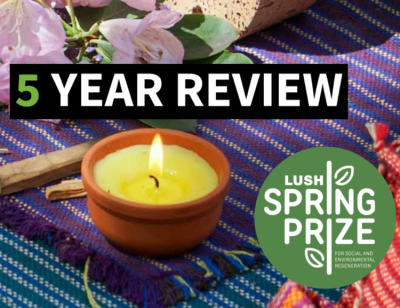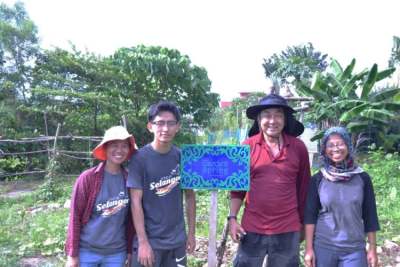Lush Spring Prize 2025 winners
58 projects from around the world were shortlisted for the £250,000 Lush Spring Prize for environmental and social regeneration.
The 2025 Lush Spring Prize received over 600 applications, almost double the amount of the 2023 prize cycle. These have been whittled down to a shortlist of 58 individual applications that cover the following categories, based on either the age or focus of the organisation:
- Intentional Award; part supported by the Dixon Foundation
- Young and Established Awards
- The Permaculture Magazine Award; run in partnership with the Permaculture Magazine
- Indigenous Knowledge and Wisdom Award; run in partnership with Be The Earth Foundation and The Savitri Trust.
2025 Award winners
19 recipients were announced during a celebratory event held in Dorset (UK) where the Lush Cosmetics company is headquartered. The event was attended by prize recipients, Spring Prize judges, Lush staff, press, funders and other regenerative practitioners.
The winning projects can be explored on the Spring Prize website.
The award ceremony can be watched on Lush's YouTube channel.
Diversity and common themes in Lush Spring Prize shortlist 2025
The shortlist was diverse, covering multiple bioregions and demonstrating many different approaches to regenerative design and work. Over 30 countries were represented in the final shortlist with applications from every continent (except Antarctica), and some countries, such as Japan, Zambia, and Myanmar, being represented on the shortlist for the first time. All shortlisted projects can be explored on the Spring Prize website.
Many shortlisted projects operate from the grassroots, are community-led and, in many cases, women-led. Despite many working on a relatively small scale, as a whole they respond to global challenges and their ripple effects, e.g. the climate and wider ecological emergency, international conflicts, and an exploitative and unstable global economy.
Applicants in Palestine, Lebanon, and Ukraine are directly impacted and responding to extreme violence, occupation, and invasion, and many others are impacted by internal conflicts within their countries or regions. The Russian war in Ukraine continues to have devastating impacts on the food security of communities across Africa, particularly those already experiencing displacement and climate impacts.
Indigenous groups living across the Amazon bioregion are on the frontlines defending rainforests from fossil fuel and other extractive industries, while many organisations across the world are using regenerative practices to build health and resilience in the face of the climate crises and the impacts that are already being felt.
Despite these huge challenges every project on the shortlist is demonstrating an alternative to climate disaster, to ecological breakdown, to conflict, and to inequality. Together they offer a story of courage, hope, and holistic practical action. They highlight how the regenerative movement continues to cultivate long-term future goals whilst also stepping up to meet urgent frontline needs.



